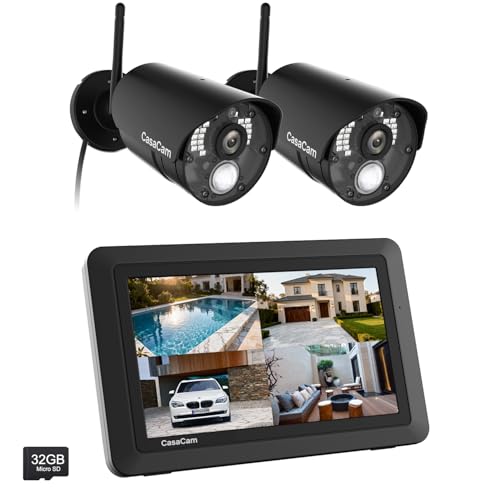


Security cameras are an essential component of modern surveillance systems, providing a critical layer of protection for homes, businesses, and public spaces. One common question that arises when setting up security cameras is whether they need separate AC power sources.
While some security cameras can be powered by PoE (Power over Ethernet) or battery, many traditional models still require a separate AC power source to operate effectively.
Having a dedicated AC power supply for security cameras can ensure consistent and reliable operation, especially in high-demand situations where continuous monitoring is crucial.
Do Security Cameras Require Separate AC Power?
Security cameras do not necessarily require separate AC power. Many security cameras are designed to be powered through a single cable that combines both power and data transmission. This type of setup is known as Power over Ethernet (PoE), which simplifies the installation process and reduces the need for separate power outlets near the camera locations.
However, some security cameras may still require separate AC power if they do not support PoE or if the installation location does not have access to Ethernet cables. In such cases, the cameras can be powered using traditional AC power sources, but this may require additional wiring and installation work.
Ultimately, whether security cameras require separate AC power depends on the specific camera model and the installation requirements. It’s important to consult the camera’s specifications and consider the installation environment when determining the power source for security cameras.
Power Source Considerations
When it comes to security cameras, power source considerations are crucial. Most security cameras require a power source to operate, and the type of power source you choose can impact the performance and reliability of your system.
Some security cameras are designed to be powered by alternating current (AC), while others can be powered by direct current (DC). AC-powered cameras typically require a separate AC power source, such as a wall outlet, to operate. On the other hand, DC-powered cameras can be powered by a centralized power supply or a battery backup system.
It’s important to consider the power requirements of your security cameras when choosing a power source. Make sure to select a power source that can provide the necessary voltage and current to keep your cameras running smoothly. Additionally, consider factors such as the distance between the power source and the cameras, as well as the reliability of the power supply.
| Power Source Type | Pros | Cons |
|---|---|---|
| AC Power | Reliable power source | Requires separate AC outlet |
| DC Power | Can be powered by centralized supply | May require battery backup |
Benefits of Separate AC Power
Separate AC power for security cameras offers several advantages:
- Reliability: With a dedicated power source, security cameras are less likely to experience power fluctuations or outages, ensuring continuous surveillance.
- Reduced Interference: Separate AC power helps minimize interference from other electrical devices, which can affect the performance of security cameras.
- Scalability: Having individual power sources allows for easier scalability and expansion of your security camera system without overloading existing circuits.
- Remote Monitoring: With separate AC power, you can remotely monitor power usage and easily detect any issues that may arise.
- Compliance: Some regulations and standards may require separate power sources for security cameras to ensure proper functionality and compliance.
Installation Flexibility
One of the key advantages of security cameras that operate on AC power is the installation flexibility they offer. Since they do not rely on a separate power source, they can be installed in a wider range of locations without the need for additional wiring or power outlets. This makes it easier to set up security cameras in areas where running power cables may be difficult or impractical.
Additionally, security cameras that use AC power can often be easily integrated into existing electrical systems, allowing for a more seamless installation process. This can be especially beneficial for retrofitting older buildings or adding security cameras to an established property without the need for major renovations.
Reliability and Stability
When it comes to the reliability and stability of security cameras, having a separate AC power source can be beneficial. By providing a dedicated power supply, you can ensure that your cameras have a consistent and uninterrupted source of power, reducing the risk of downtime or malfunctions.
Additionally, separating the power source for your security cameras can help prevent interference and potential power surges that could damage the equipment. This can ultimately contribute to the longevity and performance of your surveillance system, giving you peace of mind that your property is being monitored effectively.
Reduced Interference
One of the key benefits of using separate AC power for security cameras is reduced interference. When security cameras are powered by the same circuit as other electrical devices, there can be interference that affects the quality of the video feed. This interference can result in distorted images, flickering screens, or even complete loss of video signal.
By providing separate AC power for security cameras, you can minimize the risk of interference and ensure a clear and reliable video feed. This is especially important for high-security areas where uninterrupted surveillance is crucial.
Cost Considerations
When considering whether security cameras need separate AC power, cost is an important factor to take into account. Installing a separate power source for each camera can increase the initial setup cost significantly. Additionally, the ongoing electricity costs of powering multiple cameras can also add up over time. On the other hand, using a single power source for multiple cameras can help reduce installation and maintenance costs. However, it is important to ensure that the power source can adequately support all connected cameras without compromising their performance.







